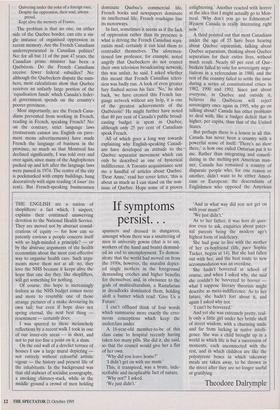If symptoms persist..
THE ENGLISH are a nation of shoplifters: a fact which, I suspect, explains their continued unswerving devotion to the National Health Service. They are moved not by abstract consid- erations of equity — for how can so patently envious a people concern itself with so high-minded a principle? — or by the abstruse arguments of the health economists about the most cost-effective way to organise health care. Such argu- ments move them not at all: no, they love the NHS because it keeps alive the hope that one day they, like shoplifters, will get something for nothing.
Of course, this hope is increasingly forlorn as the NHS budget comes more and more to resemble one of those strange pictures of a snake devouring its own tail; but even if hope does not spring eternal, the next best thing — resentment — certainly does.
I was spurred to these melancholy reflections by a recent walk I took in one of our inner-city areas — in short, and not to put too fine a point on it, a slum.
On the end wall of a derelict terrace of houses I saw a large mural depicting not entirely without colourful artistic vigour — the history and present life of the inhabitants. In the background was that old stalwart of socialist iconography, a smoking chimney-stack, while in the middle ground a crowd of men holding spanners and dressed in dungarees, amongst whom there was a smattering of men in university gowns (that is to say, workers of the hand and brain) demand- ed an end to unemployment. To demon- strate that the world had moved on from the 1930s, however, the muralist depict- ed single mothers in the foreground demanding crèches and higher benefits for themselves; and, in obeisance to the gods of multiculturalism, a Rastafarian in dreadlocks dominated them, holding aloft a banner which read: 'Give Us a Future'.
I can't offhand think of four words which summarise more exactly the erro- neous conceptions which keep the underclass under.
A 16-year-old member-to-be of this class came to hospital recently having taken too many pills. She did it, she said, so that the council would give her a flat of her own.
`Why did you leave home?'
`I didn't get on with me mum.'
This, it transpired, was a brute, inde- scribable and inexplicable fact of nature. `Why not?' I asked.
`We just didn't.' `And in what way did you not get on with your mum?'
`We just didn't.'
As to her father, it was hors de ques- tion even to ask, enquiries about pater- nal parents being the modern age's highest form of indelicacy.
She had gone to live with the mother of her ex-boyfriend (life, pace Sophie Tucker, begins at 14). But she had fallen out with her, and the best route to new accommodation was an overdose.
She hadn't bowered at school of course, and when I asked why, she said she couldn't be bowered to bower what I suppose literary theorists might describe as meta-indifference. As to her future, she hadn't fort about it, and again I asked why not.
`I can't be bowered.'
And yet she was extremely pretty, real- ly only a little girl under her brittle shell of street wisdom, with a charming smile and far from lacking in native intelli- gence. She was a child brought up in a world in which life is but a succession of moments, each unconnected with the rest, and in which children are like the polystyrene boxes in which takeaway meals are taken away, to be thrown in the street after they are no longer useful or gratifying.
Theodore Dalrymple










































































 Previous page
Previous page